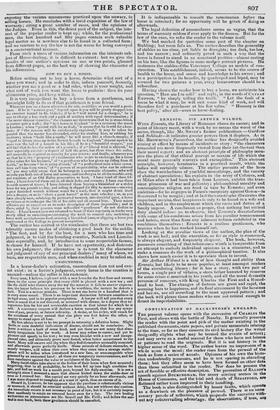ERNESTO. SIR ARTHUR WILMOT.
WITH Ernesto, the Library of Romance closes its career; and in point of literary merit, with a work by no meows the worst of the series, though, like Mr. SMITH'S former publications —Guirione and Solitude—it indicates greater powers than it displays. As in Mr. BROWNING'S Puracelsus, the author has designedly avoided aiming at effect by means of incidents or story : "the characters presented are more frequently viewed from their intellectual than their moral aspect; and an abstract principle of philosophy occu- pies the place of that ethical precept or maxim of life which the moral more generally conveys and exemplifies." This abstract principle, however, terminates in a practical result, which the ladies will certainly admire. The earlier pursuits of the hero show the wretchedness of youthful misanthropy, and the vacuity of abstract speculation ; his exploits in the army of Colonna, and at Milan after it bad been taken from Lautrec, exhibit the tran- sient pleasures of war and gallantry; philosophical morality and contemplative religion are tried in vain by Ernesto; and even ambition—for he engages in Fiesco's conspiracy against Genoa—is discovered to be nought; and at last the catastrophe illustrates the important maxim, that happiness is only to be found in a wife and children, and in the employment which the cares and duties of a family impose. A conclusion so proper, that nothing but critical duty should induce us to observe, that Ernesto's dissatisfaction with some of his conditions arises from his peculiar temperament and habits, more than from any inherent tedium exhibited in the conditions themselves : Ernesto is a restless gentleman, who marries when be has worked himself out.
Looking at she peculiar views of the author, the plan of the work is not bad; and the execution, so far as style is concerned, is always elegant, and frequently eloquent. The book, however, possesses something of that tediousness which is inseparable from an attempt to embody individual opinions hi a character, and to make a romance do the work of a philosophical treatise. It also shows how much easier it is to speculate than to invent.
Sir Arthur Wilmot is a tale of less thought and ability than Ernesto, but likely to be more popular, at least amongst readers of the circulating library : for it has a story, with two pair of lovers, a single pair of villains, a stern lather haunted by remorse for some crime committed in his youth, and all the usual dramatis personae of romance, with King Charles the First and a Round- head to boot. The changes of fortune are great and rapid, the seeming bars to happiness, and its final attainment by the heroines and heroes, are all according to the most approved pattern ; and the book will please those readers who are not critical enough to detect its improbabilities.


























 Previous page
Previous page